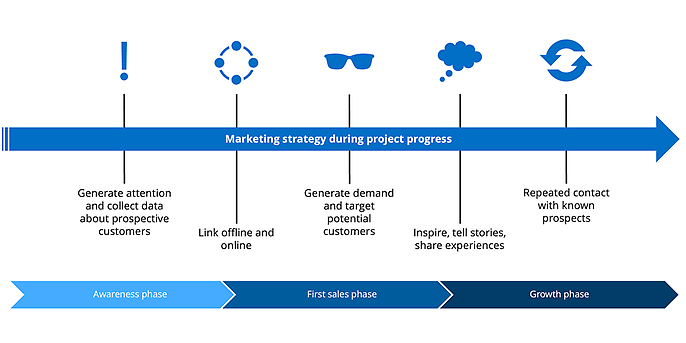4. August 2025 By Miriam Eckardt
Get started with a digital marketing strategy in seven steps
‘No strategy, no success – this is especially true in digital marketing.’
Digitalisation is advancing rapidly and fundamentally changing how people search for, communicate and consume information. 66.4 million people use the internet, 72 percent of them daily, many of them on mobile devices.
The digital world is the here and now. It brings with it enormous changes and enormous opportunities. Never before has it been possible to reach target groups so specifically and individually: via chatbots, personalised content, automation, podcasts and many other touchpoints.
But what is the right approach for your company? How do you reach your target groups and through which channels? This is exactly where a digital marketing strategy comes in. It ensures clarity, efficiency and measurable success in your digital communication.
What is a digital marketing strategy?
A digital marketing strategy is a structured plan that defines cross-channel measures along the entire customer journey, tailored to the company's goals. It combines creativity with data, strategy with operational implementation and enables a consistent, targeted user experience.
Artificial intelligence (AI) is playing an increasingly important role in shaping the relationships between companies and their customers in our digitally connected world.

Why do companies need a digital marketing strategy?
A great product is of little use if no one knows about it. A digital marketing strategy helps you make your products and services visible and ensures that your measures are implemented systematically, efficiently and successfully.
It offers:
- Structure and orientation for all marketing-related teams
- Time savings through clear processes and responsibilities
- Insights for the ongoing optimisation of your activities
- Transparency regarding goals, resources and successes
The benefits of a digital strategy at a glance:
- Clear goal definition and measurability (KPIs)
- Optimal resource planning
- Sustainable management and control of your activities
- Trust building through consistent presence, especially on social media
- Future-proof orientation of your digital communication
We support you!
With clear goals, sound analyses and individually tailored measures, we accompany companies step by step on their way to an effective digital marketing strategy. Let's take the first step together.
The 7-step process for a digital marketing strategy
There is no such thing as the perfect strategy – but there is a structured approach that every company can adapt to its individual needs. Here is a proven basic framework:
Step 1: Define your goals
Formulate clear, realistic marketing goals – and make them SMART:
- Specific: Precise goal definition
- Measurable: Measurability through KPIs
- Achievable: Realistic feasibility
- Relevant: Significance for the target group and the company
- Time-bound: Clear time frames
This will give you a comprehensible basis for planning and monitoring success.
Step 2: Analyse your target group
Identify existing and potential target groups. Use customer segmentation and develop personas, fictional representatives of your target group, based on this. The aim is to understand your customers so well that you can develop tailor-made measures.
Step 3: Analyse the status quo
Carry out an analysis of the current situation:
- Market and competition analysis
- Internal resource and channel evaluation
- Use of web and data analytics
This will help you determine your current position and identify potential for optimisation.
Step 4: Develop a strategy
Develop a strategic vision for your digital marketing:
- Which channels and measures contribute to your goals?
- Which customer journeys do you want to design for your target group(s)?
- Which digital touchpoints are crucial for success?
The result is a coherent, cross-channel strategy.
Step 5: Plan measures
The strategy must be translated into a concrete editorial plan:
- Which measures have priority?
- How are budgets allocated?
- Which channels should be used and how?
The goal is effective implementation with optimal budget allocation.
Step 6: Measure success
‘Only what is measured can be improved.’
Implement regular reports and analyses (e.g. weekly or monthly) to review the performance of your measures using relevant KPIs and data-driven insights.
Step 7: Continuously optimise
A digital strategy is never ‘finished’.
Use your data to continuously question, improve and adapt your activities. This creates a dynamic optimisation cycle that has a long-term impact.
Conclusion
Digital marketing strategies are not a ‘nice to have’, but a decisive factor for success. They provide direction, security and control in a constantly changing digital world. Those who think strategically communicate more effectively and remain relevant in the long term.
We support you!
With clear goals, sound analyses and individually tailored measures, we accompany companies step by step on their way to an effective digital marketing strategy. Let's take the first step together.

